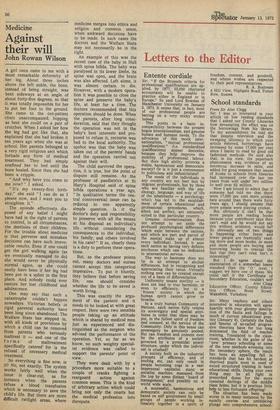Medicine
Against their will
John Rowan Wilson
A girl once came to me with a most remarkable deformity of her leg. About three inches above the left ankle, the bone, instead of being straight, was bent sideways at an angle of about forty-five degrees, so that it was totally impossible for her to put her foot to the ground. She came to the out-patient clinic unaccompanied, hopping as best she could on a pair of crutches. When I asked her how the leg had got like that, she explained that she had broken it ten years ago when she was at school. Her parents belonged to a very rigid religious sect which forbade any form of medical treatment. They had simply confined her to bed until the bone healed. Since then she had been a cripple.
"And why have you come to me now? " I asked.
" It's my twenty-first birthday," she said " I can do as I please now, and I want you to straighten it."
The episode effectively disposed of any belief I might have had in the right of parents to control, in all circumstances, the destinies of their children. For the trouble about medicine is that perverse and mistaken decisions can have such irrevocable results. Even if one could get the girl walking again (as we eventually managed to do) she would never be physically normal again, as she could easily have been if her leg had been put in a splint in the first place. And nobody could ever restore her lost childhood and adolescence.
One may say that such a catastrophe couldn't happen nowadays. Victorian beliefs in rigid parental authority have been long since abandoned. The Welfare State has stepped in, with all kinds of provisions by which a child can be removed from parents who seriously maltreat it — and one of the forms of maltreatment specifically catered for is the refusal of necessary medical treatment.
So everything is fine now, is it? No, not exactly. The system works fairly well when the issue is clear-cut, as for instance when the parents refuse a blood transfusion which is necessary to save the child's life. But there are more difficult twilight areas, where medicine merges into ethics and religion and common sense, when awkward decisions have to be made. In such cases the doctors and the Welfare State may not necessarily be in the right.
An example of this was the recent case of the baby in Hull with spina bifida. The baby was paralysed in its lower limbs, its spine was open, and the brain was also affected. Left alone, it was almost certain to die. However, with a modern operation it was possible to close the spine and preserve the baby's life, at least for a time. The doctors recommended that this operation should be done. When the parents, after long consideration, said that they thought the operation was not in the baby's best interests and proposed to refuse it, recourse was had to the local authority. The upshot was that the baby was taken out of the parents' hands and the operation carried out against their will.
The child survived the operation, it is true, but the point of dispute still remains. As the professor of paediatrics at St Mary's Hospital said of spina bifida operations a year ago, "In qualitative terms the central controversial issue can be reduced to one apparently simple question. Is it the doctor's duty and responsibility to preserve with all the means at his disposal an individual's life without considering the consequences to the individual, his family, and others involved in his care? " If so, clearly there is a duty to perform these operations.
But, as the professor points out, many doctors and nurses cannot accept this categorical imperative. To put it bluntly, they believe that before saving life, one should consider whether the life to be saved is worth living.
This was exactly the argument of the parents and it needs to be looked at with great respect. Here were two sensible people taking up an attitude which is shared by medical men just as experienced and distinguished as the surgeon who advised the performance of the operation. Yet, so far as we know, no such weighty specialist evidence was called to support the parents' point of view.
They were dealt with by a procedure more suitable to a couple of cranks fighting a rearguard action against common sense. This is the kind of arbitrary action which could bring not only the courts but the medical profession into disrepute.


































 Previous page
Previous page